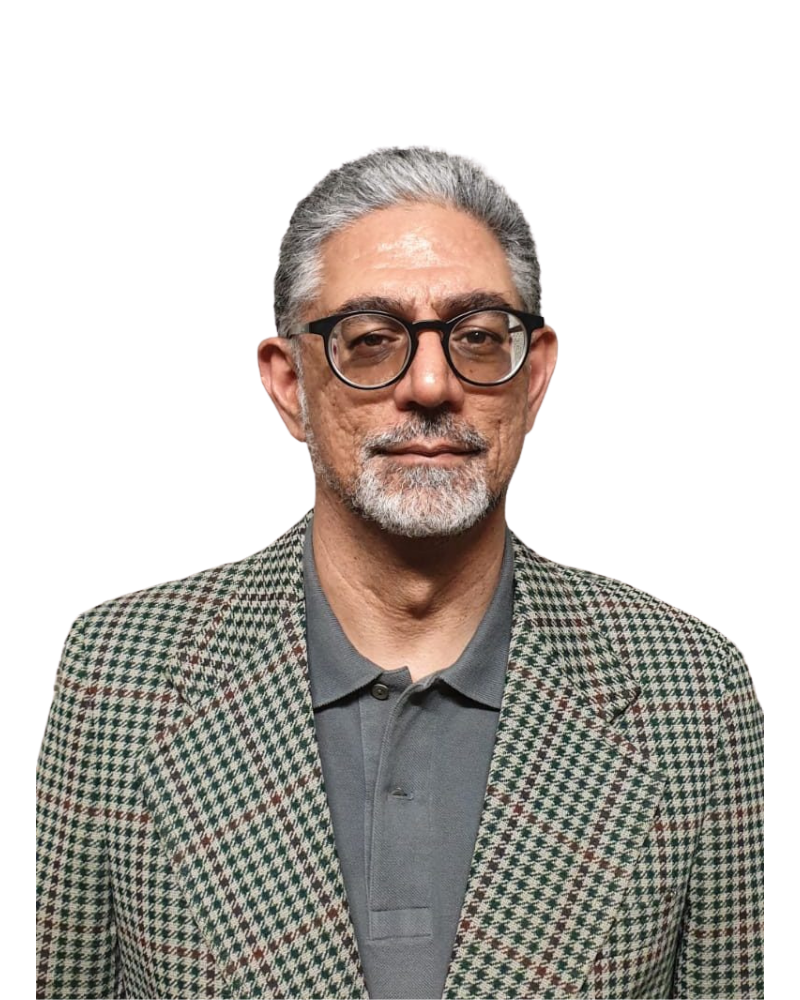ABOUT SAMNET
SAMNET Engages Constructively With The Media, And Empowers Communities To Make A Change.
South African Muslim Network Founded in 2008 by Dr Faisal Suliman
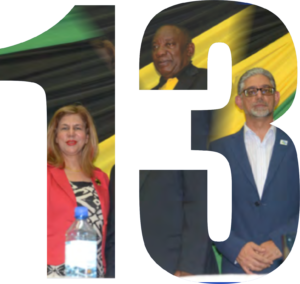
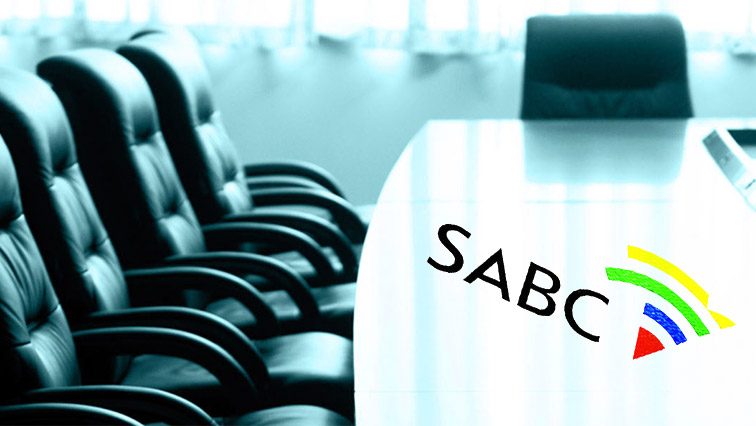
Join with us
Together We Can Make A Change
We have the power to stand up against Islamaphobia
SAMNET, through its monitoring and complaints to media statutory bodies such as the BCCSA, has successfully lodged complaints resulting in the SABC being fined on two occasions for islamophobia and other stories which were prejudicial against Muslims. Our efforts further included the stopping of the use of the word “Islamic terrorism” in SABC news broadcasts. Our complaints have ensured that the SABC portrays its stories fairly and that there is a balanced reporting. This of course needs continuous work in the monitoring and engaging with media.
Success Rate
96%
LETTERS & CERTIFICATES
An Expression Of Our Humanity!
Dr Faisal Suliman Handing over a token of appreciation to World Icon Nelson Mandela
Explore our great history!!
Our Founders Are Always Recognising And Meeting Our South African Heroes.
We Recognise Our Fellow Citizens
SAMNET ensures that all South Africans who have excelled locally or internationally receive complimentary recognition letters from SAMNET. Where there have been natural disasters and similar tragic events all over the world, we have conveyed the well wishes and condolences of our community as an expression of our humanity.
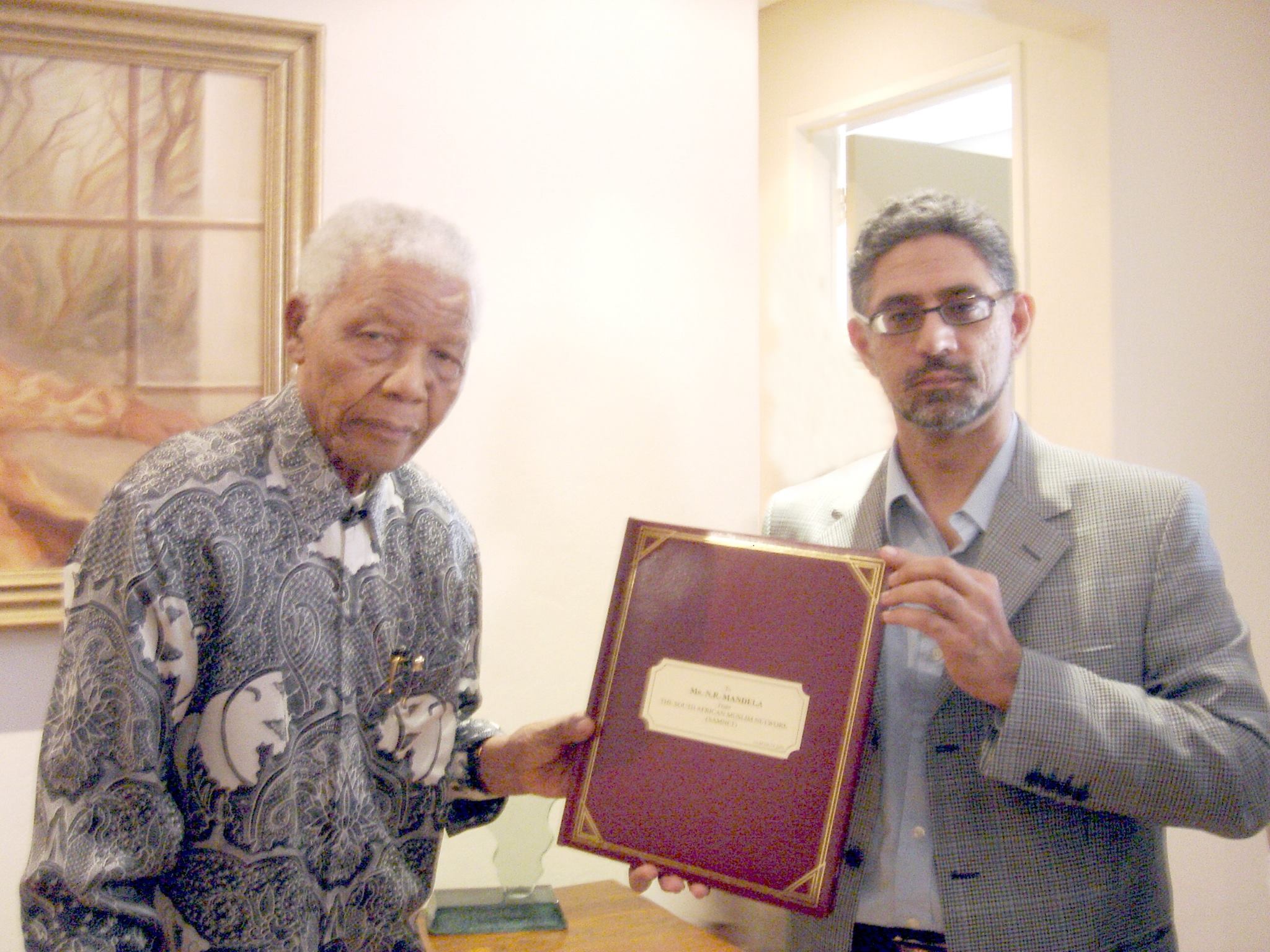
Some Facts Regarding SAMNET
SAMNET attended workshops and made submissions to the SABC for consideration in its editorial policies. Without SAMNET’s interventions the present marked bias would be even more pronounced. SAMNET spokespeople are often providing analysis and comment in the media on local and international issues. Much of the work with the media also involves public relations and building bridges by sending information packs, such CV’s and biographies of analysts and guests with alternative views, CDs and DVDs covering topics of interests to Muslims.
Our pictograms and social media presence has reached millions of people highlighting issues such as education, voter registration, participation in the census, blood donor drives, campaigns to save rhinos and other endangered species. Pictograms also include advocacy and raising awareness of human rights issues internationally.
SAMNET works with various multinationals and local companies and schools in education drives about Ramadaan, Muslim holidays like the two Eids, and addressing issues of the dress code, particularly as it applies to ladies. very successful feedback was received and some preconcieved misconceptions were addressed successfully during some workshops that were helped with companies.
SAMNET has for the past few years been collating information annually on bursaries for tertiary education and distributing this information in our monthly electronic newsletters and on our website.
SAMNET embarked on a very successful Twitter and Facebook training campaign for ladies, which enabled them to engage with and also monitor their children on social media, whilst at the same time learning to use social media to raise awareness and to challenge islamophobia and stereotyping. The SAMNET office drives the campaigns and the ladies group then uses social media to raise and highlight these issues. SAMNET is ranked amongst top sites people visit on LinkedIn for connectivity and exposure.
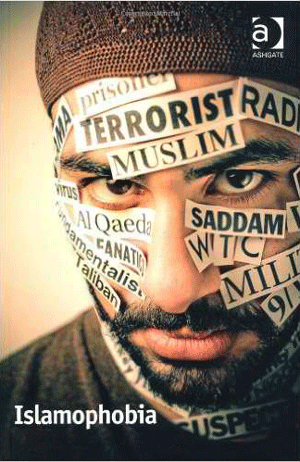
SAMNET has repeatedly taken up issues on behalf of individual Muslims who have raised issues of islamophobia and incidents of harassment and prejudice towards them on the basis of their religious affiliation in the workplace. SAMNET initiated a Hate Crime Register where people can report such incidents so that we can develop a database of these hate crimes which can then be used to in the formulation of policies and to direct policing. SAMNET was the first Muslim organisation to engage the Mazibuye African Forum on their hate speech and derogatory comments regarding Indians. We partnered with other stakeholders and organisations to challenge them.
We have successfully engaged with various companies where Muslim individuals were facing some form of discrimination and harassment, and our approach aimed at understanding and reconciliation has thus far not seen the need for these issues to go to Court or the CCMA, to find amicable solutions where such complaints were received.
SAMNET, using our networking and social media capabilities, was instrumental in assisting the Durban North and Queensburgh Islamic Societies in getting public awareness and support for their rezoning applications. SAMNET worked closely with other humanitarian and human rights organisations to highlight and draw support for human rights abuses in areas like DRC, CAR, Nigeria, Somalia, Libya, Palestine, Syria, Myanmar and Kashmir. SAMNET worked with non-Muslim organisations and church groups to raise awareness on various activism initiatives.
SAMNET is a founding member of the Legacy Foundation which was setup to organise the commemoration of the 150th anniversary of the arrival of Indians to the shores of South Africa.
SAMNET commissioned and published the book Muslim Portraits, authored by Professor Goolam Vahed which captures the lives of some of our apartheid struggle activists. We are collating biographies on other activists who were not included in the first book and we intend to publish another book in the same vein. The portraits book has been donated to schools, libraries, universities and relevant foundations.
We have commissioned research for a book that will record and document the role of Muslim majority countries, other Muslim organisations and individuals internationally in the anti-apartheid movement. We believe that its critical to the South African narrative that this history which has not been documented, be showcased lest it be forgotten forever.
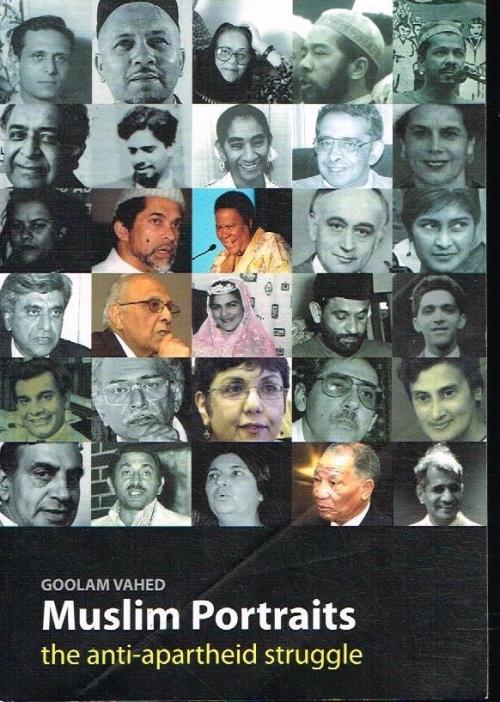
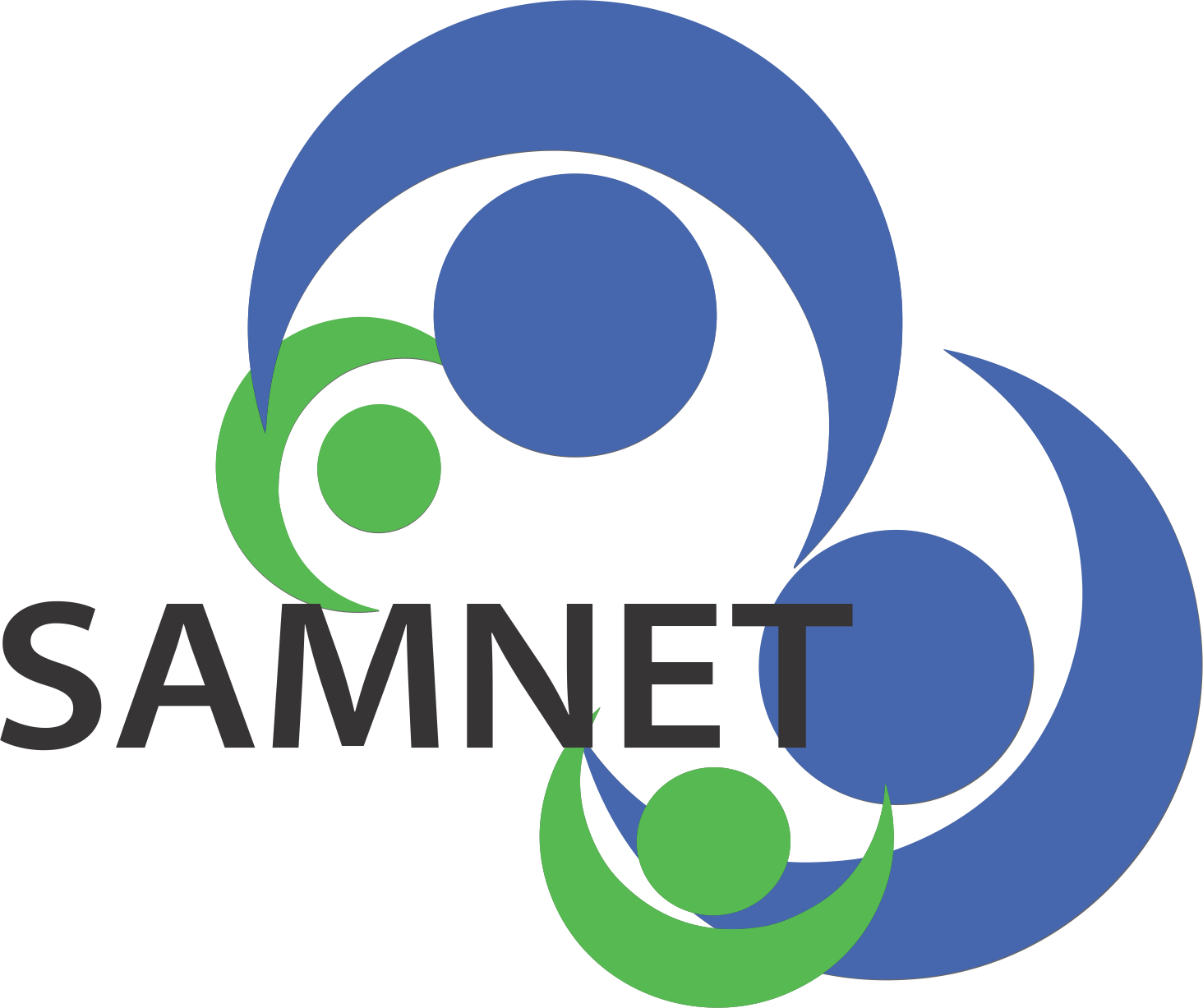
We have supported campaigns to reduce the legal alcohol limit for driving, worked with other faith groups to raise awareness and oppose the legalisation of slot machines in shopping malls, the proposed nudist beach on the South Coast, oppose a 24-hour porn channel on Top TV and international private control of the security industry.
SAMNET has hosted many local and international activists, experts and politicians and in partnership with other organisations, facilitated networking for the Muslim community. We participated in the launch of ASRI and we chaired one of the sessions and look forward to driving the ASRI aims.
A project we excited about is the National Mosque Open Day. In partnership with other organisations, Imams and Mosque management committees, we envisage a national campaign in which we open our Mosques to the public jointly on one day. The objective is to have people visit our mosques to be educated and enlightened on Islam and on what goes on in our Mosques and Madressas, in order to address misconceptions and stereotypes. At the same time it will provide an opportunity for engagement and for these visitors to get free literature, Qurans, DVD’s and other information. Ideally the Mosque Open day should be on Heritage day between Zohar and Asr, which would also blend in with the themes Heritage day. We have had a few mosques that have already signed onto the concept, and with publicity and greater awareness we believe that we we can make this an iconic national event in which we interact with our fellow South Africans and address issues concerning the Muslim community. With enough national publicity and public awareness this can become a very powerful medium for us to educate people about Islam and to forge better co-operation and relationships with the other communities.
SAMNET was part of a group that held an open information session in Durban North on Islam along the same concept that we envisage for National Mosque Open Day. The event was very successful from a Muslim PR perspective and very much appreciated by the Durban North non-Muslim residents.
SAMNET will be hosting a media bosberaad in which we are inviting all the Muslim print and electronic media. We believe that greater co-operation and sharing of expertise and resources can significantly enhance the overall capabilities, reach and effect of Muslim-centric news to the point that we develop own news bureaus. To this end we have started a bursary fund specifically for studies in media, political science and related fields.
A further project envisioned for the future is an Islamic Museum that showcases Islamic History, Culture, Civilisation and our diversity.
SAMNET members have for the past few years been doing social welfare, relief and feeding programs. This has now been formalised into the Caring Sisters Network (CSN), an organisation, though a division of SAMNET, run independently of SAMNET but with support and management from SAMNET.
There is a lot more work that has been done which cannot be detailed in this brochure but you are welcome to subscribe to the Monthly Newsletters for more information about our activities.
SAMNET is an open and transparent organisation and you are welcome to attend meetings and to volunteer your services in any capacity. We are always looking to expand the organisation, to grow the competence, range of skills and the resource base of the organisation. We would particularly invite younger people and younger professionals to come and join SAMNET, and to help raise it to even greater heights.
A Message from Our Chairman - dr faisal Suliman
Most of SAMNET activities are hard to quantify because they involve background networking, advocacy, public relations and lending support to campaigns locally and internationally that speak to our concerns as muslims and as human beings.
Since inception SAMNET has constantly been engaging with television stations, various radio stations, print and social media about issues that are of concern and interest to the Muslim community.
We have interacted with an open mind of engagement and bridge building but at the same time, when necessary, challenged the media and lodged complaints via the statuary bodies. We have addressed issues from the lack of coverage regarding issues close to the Muslim community, to issues of balance, to blatant prejudiced and Islamaphobic reporting.
